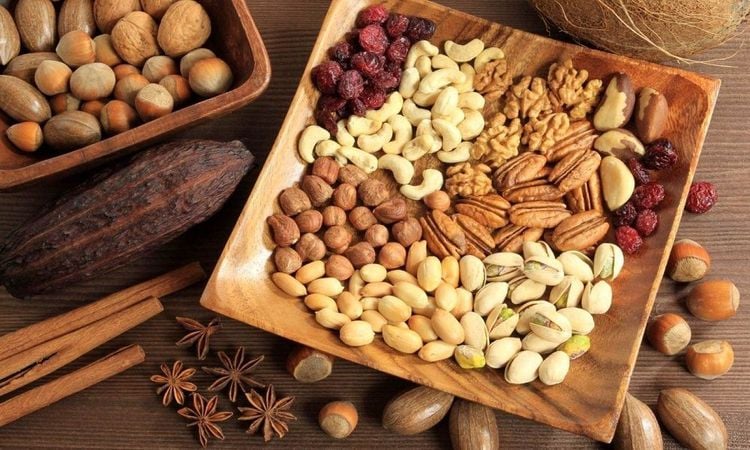This article is written under professional supervision of OB-GYN doctors in Vinmec International General Hospital, Hai Phong.
DHA is extremely beneficial for the health of both the mother and the baby, supporting the development process of the fetus’s brain and vision. This process occurs throughout the pregnancy and peaks in the third trimester. Knowing about DHA supplementation in pregnancy not only provides the baby with the best condition for brain development, but also ensures a healthy pregnancy for the mother, reducing the risk of premature birth.
1. What is the roles of DHA?
DHA (Docosahexaenoic Acid) is an Omega-3 unsaturated fatty acid. This is an essential nutrient for the brain and eye development of the baby, starting during pregnancy and continuing through the first two years of life.
The brain formation and development of the fetus starts during the very first weeks in the womb. From week 13 to week 24, the vision and hearing of the baby has been formed, enabling them to hear their mother’s voice and start to receive information. Close to the estimated due date, the baby’s brain size is about 25% that of an adult. Studies in animals have shown a high concentration of DHA in nervous tissues such as retina and brain structures. Therefore, a DHA deficiency can negatively affect the structure and function of these organs.
Trắc nghiệm: Bạn có hiểu đúng về dấu hiệu mang thai sớm?
Các dấu hiệu mang thai sớm không phải chỉ mỗi trễ kinh mà còn có rất nhiều dấu hiệu khác như xuất huyết âm đạo, ngực căng tức,… Điểm xem bạn biết được bao nhiêu dấu hiệu mang thai sớm thông qua bài trắc nghiệm này nhé!
2, How much DHA is needed in pregnancy?
The diet before and during pregnancy is very important for the storage of essential unsaturated fatty acids (EFAs: Essential Fatty Acid) for the fetus. Especially in the last 3 months of pregnancy, the fetus average need for DHA is 2,2g EFAs/day to supplement for the brain and blood vessels development

According to the WHO recommendation, depending on each period of pregnancy, women need to supplement from 100-200 mg of DHA per day. To be specific:
During the first trimester: Having a varied, balanced and nutritious diet would help expecting mothers absorb a diverse range of nutrients from natural sources, reduce the risk of miscarriage, and most importantly, support the baby’s optimal development inside the womb.
During the second trimester: This is the period when enhancing the quality of DHA sources is essential, because of the continuous and strong development of the fetus brain, with more than 250.000 neurons formed per minute. Therefore, DHA plays an important role in maintaining cell membrane fluidity, accelerating nutrients exchange and communication between neurons.
During the third trimester: The brain and body size of the fetus is growing fast, thus requiring a large amount of fatty acid to concentrate for the development of the brain and vascular system. This is also the period with high DHA need to reduce the risk of premature birth and preeclampsia (a type of high blood pressure in pregnancy) as well as indirectly support the baby's optimal growth in their first years of life by enhancing breast milk quality.
Omega-3 fatty acids can also protect the body against cardiovascular diseases, stroke, and reduce arthritis.
3, What are the consequences for DHA deficiency in pregnancy?
For pregnant women, DHA deficiency can negatively affect both the mother and the child. Expecting mothers might have to face a higher risk of premature birth, preeclampsia as well as postpartum depression (after-birth sadness), menopause problems, osteoporosis (brittle bones) and other cardiovascular diseases in the long term.
For the fetus, due to the lack of DHA, the amount and quality of red blood cells would decrease, reducing the ability to meet nutritional and oxygen demand for the fetus' general development, in which the central nervous and the retina are most heavily affected. This can limit intelligence, leading to impair learning ability, slow growth, and reduced vision compared to other children who receive adequate DHA supplementation.
4. How to supplement DHA?

As the human body cannot provide itself with DHA, prioritizing DHA-rich food in this period is especially important. Foods rich in DHA include:
- Sea fish: Sea fishes such as salmon, mackerel, tuna, sardine,... is an ideal DHA source to develop children’s intelligence. However, pregnant mothers should only eat a moderate amount of sea fish (300g/week) to avoid mercury poisoning and heavy metal.
- Egg yolk: This is also a DHA-rich food. However, egg yolk’s effect can only be brought into play when fully cooked, and one should not eat soft-boiled egg or whipped egg.
- Cereal: Nuts such as almond, walnut, cashew,... after processing is a good snack for pregnant mothers, it’s not only rich in DHA which is good for the child’s intelligence, it also strengthens the child’s eyesight. Cereal is one of the DHA-rich foods.
- Vegetables: Vegetables such as broccoli, cabbage, pumpkin, kale, watercress,... are also rich in DHA and fibers, plus it also helps pregnant mother’s meals to be more diverse.
Moreover, DHA is also added for pregnant mothers’ specialized milk which helps with the baby’s development. Also, pregnant mothers can also choose to consume functional foods which include DHA and multiple vitamins with their amount specialized for pregnant mothers. However, before using them, pregnant mothers should consult with nutritionists to have an idea about the amount needed and the DHA shortage in daily meals.
In short, DHA is good for both pregnant mothers and the child. During the pregnancy period, the mother’s body needs a large amount of DHA to develop the child’s brain, especially during the 2nd and 3rd trimester.
To arrange an appointment, please call HOTLINE or make your reservation directly HERE. You may also download the MyVinmec app to schedule appointments faster and manage your reservations more conveniently.
Reference source: National Institute of Nutrition














